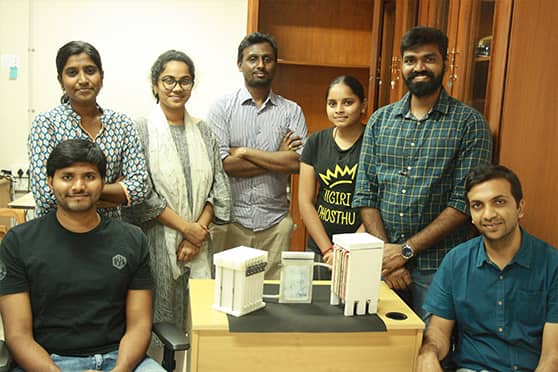IIT Madras researchers propose affordable zinc-ion battery for EVs


Researchers at Indian Institute of Technology (IIT) Madras are developing mechanically-rechargeable zinc-air batteries, an economical alternative to lithium-ion batteries, for electronic vehicles (EV), the institute said in a statement.
The zinc-air batteries, which are said to have a longer shelf life than lithium-ion batteries, will have use in two-wheeler and three-wheeler EVs, IIT Madras added in its statement.
Collaborating with major industries, the IIT researchers have filed for patents for this new battery technology. Aravind Kumar Chandiran, assistant professor, Department of Chemical Engineering, IIT Madras, is leading the team of researchers which is focusing on the cost-effective alternative to lithium-ion batteries. Their research focuses mainly on zinc-air batteries as zinc is a widely available resource in India.
The need for batteries in the Indian EV sector has grown rapidly due to favourable policies from the government adding an increased call for reduction of pollution. Currently, most EVs use lithium-ion batteries which are mostly produced in China. The Indian EV manufacturers are forced to import lithium-ion batteries from China as it is the leading EV battery manufacturing country.
There are several limitations that lithium-ion batteries have, such as limited availability. Lithium-ion batteries alone cannot fulfil the diverse needs of the Indian market.
Highlighting the focus of their research, Chandiran, said, “Our research group is developing a futuristic model for zinc-air batteries for EVs. Through this research, we are also identifying shortcomings in existing technology and finding ways to address them. The research team has currently developed zinc-air cells and is working towards developing zinc-air packs for EVs.”
The zinc-air batteries can be recharged at zinc recharge stations which will be similar to petrol stations, the researchers have proposed. At these recharge stations, using the technology based on ‘battery swapping’ the users can replace the used zinc cassettes of the battery with fully-charged ones.
Explaining the recharge process, Chandiran, said, “This is a major advantage of the zinc-air batteries as currently the only option available with the lithium-ion batteries is that the entire used battery pack has to be removed and be swapped with a complete lithium-ion battery pack. This results in double the capital investment in the case of lithium-ion batteries.”
Further making the recharge process environment-friendly, the researchers have proposed that the zinc cassettes will be charged through solar panels.
Talking about the project, Akhil Kongara, a research scholar at IIT Madras, said, “According to the proposed plan, an EV user will only have to spend a few minutes at the zinc recharge stations to swap zinc cassettes.”
Gunjan Kapadia, another research scholar who is working on the zinc-air batteries and lithium-ion batteries’ operational safety, said, "The indigenously developed zinc-air batteries, specifically in an Indian context, are extremely safe as they have aqueous electrolyte and don’t catch fire even in worst-case scenario of EVs accident"
The use of zinc-air batteries is advantageous because zinc is widely available in India so it will reduce dependence on import. Zinc is cheaper as compared to lithium-ion batteries. Lithium-ion batteries cost USD 200 to USD 250 a kilowatt-hour (KWhr), while zinc-air batteries cost around USD 150 KWhr and can go below USD 100 KWhr with wider use. The water-based zinc-air batteries have a longer shelf life and better turnaround efficiency.